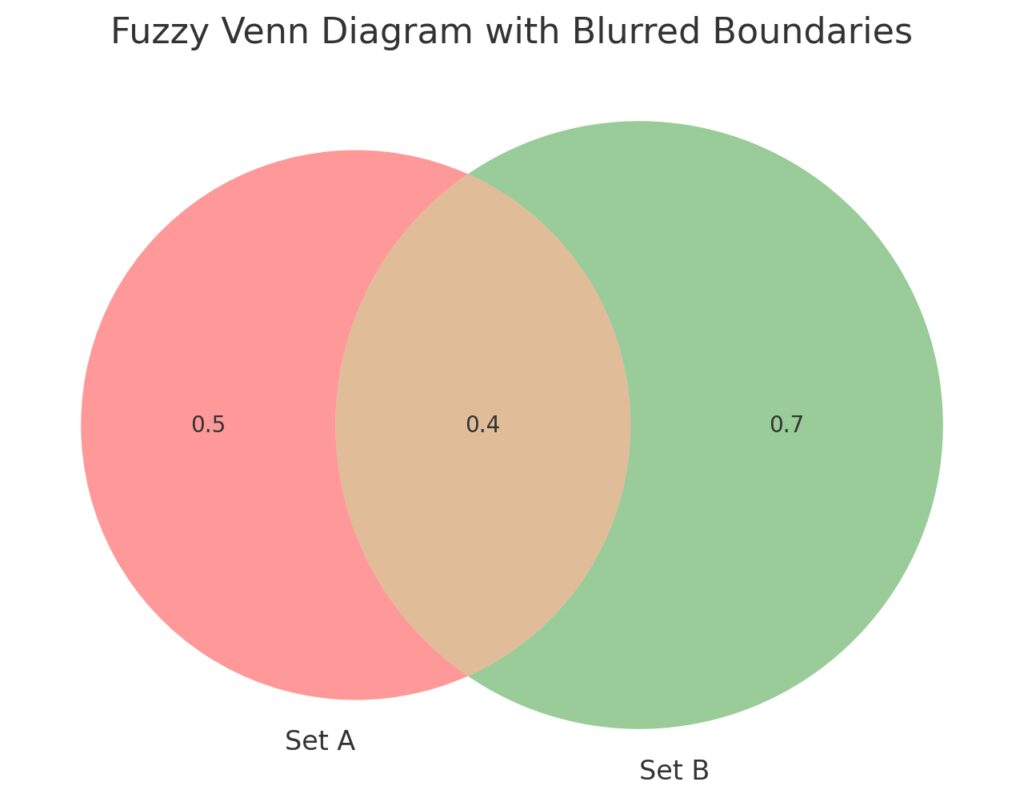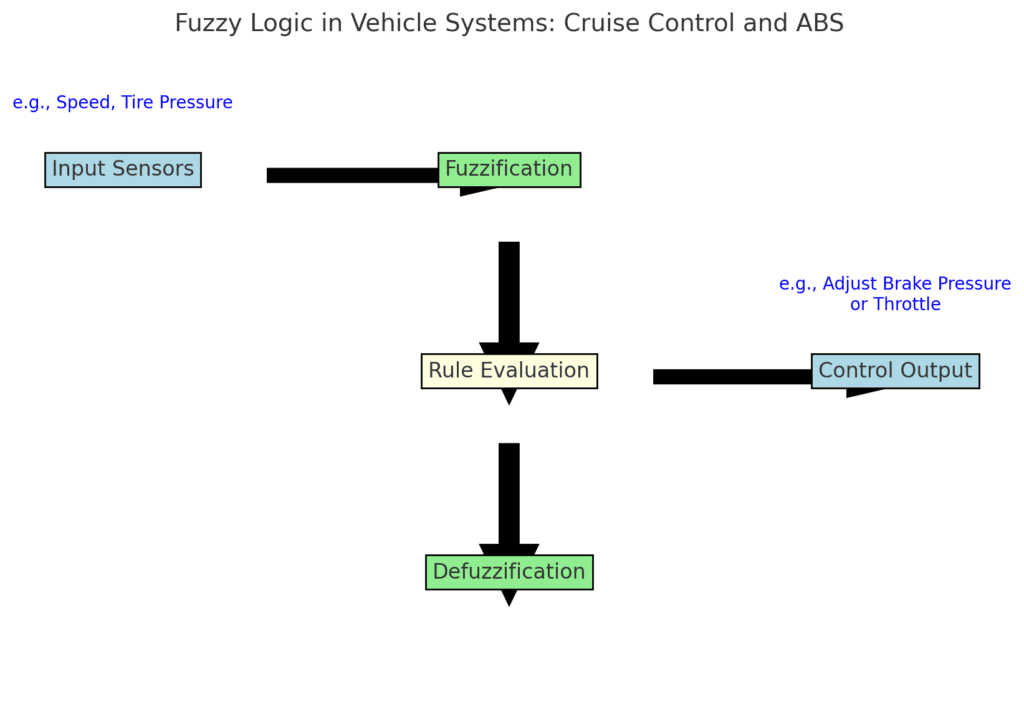
In the world of artificial intelligence (AI), not everything is black and white. That’s where fuzzy logic steps in, allowing AI systems to handle uncertainty, ambiguity, and complex data.
Unlike traditional logic, which works with precise, yes-or-no outcomes, fuzzy logic thrives in the gray areas. Below, we’ll explore how fuzzy logic works, why it’s essential in AI, and how it’s applied across various industries.
The Essence of Fuzzy Logic
Fuzzy logic, proposed by Lotfi Zadeh in 1965, operates on the principle of partial truth, where truth values range between completely true and completely false. This stands in contrast to classical binary logic, which is strictly dichotomous.
Principles of Fuzzy Logic
- Fuzzy Sets: Unlike classical sets where an element either belongs or doesn’t belong, fuzzy sets allow for degrees of membership. For example, in a fuzzy set representing “tall people,” individuals can belong to the set to varying degrees based on their height.
- Membership Functions: These functions define how each element in the input space is mapped to a membership value between 0 and 1.
- Fuzzy Rules: Derived from expert knowledge, these rules describe how to make decisions based on fuzzy logic. An example rule might be, “If the temperature is high, then the fan speed should be high.”
Fuzzy logic is a way to model the uncertainty and ambiguity that is inherent in human reasoning and natural language.
— Lotfi Zadeh, Creator of Fuzzy Logic
Implementing Fuzzy Logic in AI Systems
Designing Fuzzy Inference Systems
A fuzzy inference system (FIS) uses fuzzy logic to map inputs to outputs. The process involves several steps:
- Fuzzification: Converting crisp inputs into fuzzy values using membership functions.
- Rule Evaluation: Applying fuzzy rules to the fuzzified inputs to generate fuzzy outputs.
- Aggregation: Combining the outputs of all rules.
- Defuzzification: Converting the aggregated fuzzy output back into a crisp value.
Case Study: Fuzzy Logic in Autonomous Vehicles
In autonomous vehicles, fuzzy logic is used to handle uncertain and dynamic environments. For instance, a fuzzy logic controller can manage the car’s speed by considering imprecise inputs like traffic density and road conditions. The rules might include, “If traffic density is high and road conditions are poor, then reduce speed significantly.”
Comparing Boolean logic and fuzzy logic

Venn Diagram
to show how a value can belong to multiple sets with varying degrees of membership.

- Input Data: The process starts with receiving input data, which typically consists of crisp values.
- Fuzzification: The input data is then converted into fuzzy sets through a process called fuzzification. This step translates the crisp input into degrees of membership across predefined fuzzy sets.
- Rules Applied: After fuzzification, a set of rules is applied. These rules are based on expert knowledge or predefined logic, which uses the fuzzy inputs to determine fuzzy outputs.
- Defuzzification: The fuzzy output from the rules is then converted back into a crisp value through defuzzification, making it usable in the real world.
- Output: The final step is producing the output, which is the result of the entire fuzzy logic process.
Advanced Applications of Fuzzy Logic in AI
Natural Language Processing (NLP)
In NLP, fuzzy logic helps in understanding and processing human language, which is inherently ambiguous. For example, sentiment analysis can benefit from fuzzy logic by assigning degrees of positivity or negativity to phrases, rather than a binary classification.
Image Processing and Computer Vision
Fuzzy logic enhances image processing by allowing systems to handle blurred or unclear images. It can improve edge detection, object recognition, and noise reduction. In medical imaging, fuzzy logic helps in accurately identifying and classifying anomalies.
Expert Systems
Expert systems utilize fuzzy logic to replicate human expertise in specific domains. In financial forecasting, for instance, fuzzy logic can incorporate expert knowledge to predict market trends by considering various imprecise factors like economic indicators and investor sentiment.

Advantages of Fuzzy Logic
- Handles Uncertainty: Fuzzy logic is particularly powerful in dealing with systems that are inherently uncertain or where inputs are imprecise.
- Flexibility: Unlike rigid Boolean logic, fuzzy logic can adapt to changing conditions and requirements, making it useful in a wide range of applications.
- Modeling Complex Systems: Fuzzy logic can model complex, non-linear systems that would be difficult or impossible to describe with traditional mathematical approaches.
Limitations of Fuzzy Logic
While fuzzy logic is incredibly versatile, it does have some limitations:
- Computational Complexity: Because it deals with a range of values rather than binary states, fuzzy logic can be more computationally intensive.
- Dependence on Expert Knowledge: Designing a fuzzy logic system often requires expert knowledge to define the membership functions and rules, which can be subjective and difficult to standardize.
- Interpretability: The results of a fuzzy logic system can sometimes be difficult to interpret, especially when dealing with highly complex systems.
Integrating Fuzzy Logic with Other AI Techniques
Fuzzy-Neural Networks
Combining fuzzy logic with neural networks results in neuro-fuzzy systems. These systems leverage the learning capabilities of neural networks with the reasoning strengths of fuzzy logic. A neuro-fuzzy system can adjust its fuzzy rules based on new data, enhancing its adaptability and accuracy.
Fuzzy Logic and Machine Learning
Fuzzy logic can be integrated with machine learning algorithms to handle noisy and incomplete data. For example, in classification tasks, fuzzy logic can improve the robustness of machine learning models by allowing for partial membership in multiple classes.
Challenges in Fuzzy Logic Implementation
- Complexity in Rule Design: Creating effective fuzzy rules requires deep domain knowledge and can be labor-intensive.
- Computational Overhead: Fuzzy logic systems, especially when integrated with other AI techniques, can be computationally intensive.
- Interpretability: While fuzzy logic systems are more interpretable than some black-box models, the complexity of rules and membership functions can still pose challenges.
Fuzzy logic does not seek to replace conventional logic; instead, it extends the boundaries of classical reasoning to accommodate the vagueness and ambiguity of human thought.
— Robert Fuller, Expert in Fuzzy Reasoning
Real-World Examples of Fuzzy Logic Transforming Industries
Automating Manufacturing Processes
In automated manufacturing, fuzzy logic is used to manage temperature controls, robotic arms, and conveyor belts. It allows for more responsive adjustments to variations in machinery, helping prevent accidents and improve efficiency. For example, if an automated system detects a minor issue with a conveyor belt, it can adjust speed incrementally rather than abruptly stopping the belt, which reduces downtime.
Powering Intelligent Energy Management
Fuzzy logic also plays a crucial role in energy management systems. By analyzing real-time data on temperature, demand, and supply, fuzzy logic can optimize energy distribution. Power grids can rely on fuzzy logic to adjust output based on factors like peak demand hours and changing weather conditions, resulting in more sustainable and cost-effective energy use.
Enabling Smarter Autonomous Drones
Autonomous drones, often used in surveillance, agriculture, and delivery, leverage fuzzy logic to interpret complex environments. By assessing variables like wind speed, altitude, and obstacle proximity, drones equipped with fuzzy logic make smoother, more reliable adjustments in unpredictable surroundings. This is especially valuable for drones operating in crowded or obstacle-heavy areas.
Future Directions for Fuzzy Logic in AI
Hybrid Systems
The future of fuzzy logic in AI lies in hybrid systems that combine multiple AI techniques to leverage their collective strengths. This includes integrating fuzzy logic with deep learning, genetic algorithms, and reinforcement learning.
Enhanced Learning Capabilities
Research is ongoing to enhance the learning capabilities of fuzzy logic systems. This includes developing algorithms that can automatically generate and optimize fuzzy rules from data.
Broader Applications
As AI continues to penetrate various sectors, the application of fuzzy logic will expand. Potential areas include smart cities, healthcare, environmental monitoring, and personalized recommendation systems.
Conclusion
Fuzzy logic bridges the gap between the precision of mathematics and the perceptual nuances of human reasoning. Its ability to handle uncertainty and imprecision makes it a vital tool in the AI toolkit. By exploring and advancing fuzzy logic, we can create more intelligent, adaptable, and human-like AI systems that are better equipped to navigate the complexities of the real world.
FAQ: Fuzzy Logic in AI
What is Fuzzy Logic?
Fuzzy logic is a mathematical framework for dealing with uncertainty and imprecision. Unlike traditional binary logic that operates on true or false values, fuzzy logic allows for reasoning with degrees of truth, which is useful in real-world scenarios where information is often incomplete or ambiguous.
How does Fuzzy Logic differ from traditional binary logic?
Traditional binary logic is strictly dichotomous, meaning an element is either true or false. Fuzzy logic, on the other hand, operates on a continuum of truth values ranging from 0 to 1. This allows for more nuanced decision-making, similar to human reasoning.
Who invented Fuzzy Logic?
Fuzzy logic was introduced by Lotfi Zadeh, a professor at the University of California, Berkeley, in 1965. He developed this concept to handle the inherent uncertainty in natural language and human reasoning.
What are the main components of a Fuzzy Logic system?
A fuzzy logic system typically consists of:
- Fuzzification: Converting crisp inputs into fuzzy values.
- Rule Evaluation: Applying fuzzy rules to these inputs.
- Aggregation: Combining the outputs of all rules.
- Defuzzification: Converting the aggregated fuzzy output back into a crisp value.
What are some applications of Fuzzy Logic in AI?
Fuzzy logic is used in various AI applications, including:
- Control Systems: Used in appliances like washing machines and industrial machines for efficient operation.
- Decision-Making: Helps in areas like medical diagnostics and financial forecasting by evaluating imprecise inputs.
- Pattern Recognition: Enhances image and speech recognition by handling ambiguous data.
- Natural Language Processing (NLP): Assists in understanding and processing human language by managing ambiguity.
How is Fuzzy Logic used in autonomous vehicles?
In autonomous vehicles, fuzzy logic manages uncertain and dynamic environments. For example, a fuzzy logic controller adjusts the car’s speed based on traffic density and road conditions using rules like, “If traffic density is high and road conditions are poor, then reduce speed significantly.”
Can Fuzzy Logic be combined with other AI techniques?
Yes, fuzzy logic is often integrated with other AI techniques, such as:
- Neuro-Fuzzy Systems: Combine fuzzy logic with neural networks to enhance adaptability and accuracy.
- Fuzzy Logic and Machine Learning: Improve robustness in classification tasks by handling noisy and incomplete data.
What are the advantages of using Fuzzy Logic in AI?
The benefits of fuzzy logic in AI include:
- Improved Accuracy: Produces more accurate results by considering degrees of truth.
- Enhanced Adaptability: Systems can adapt to changing conditions and learn from new data.
- Cost-Effectiveness: Implementing fuzzy logic systems can be more affordable than other complex AI models.
What are the challenges of implementing Fuzzy Logic?
Challenges include:
- Complex Rule Design: Requires deep domain knowledge and can be labor-intensive.
- Computational Overhead: Can be computationally intensive, especially when combined with other AI techniques.
- Interpretability: While generally more interpretable than black-box models, complex rules and membership functions can still pose challenges.
What is the future of Fuzzy Logic in AI?
The future of fuzzy logic in AI involves:
- Hybrid Systems: Combining fuzzy logic with other AI techniques to leverage collective strengths.
- Enhanced Learning: Developing algorithms that can automatically generate and optimize fuzzy rules from data.
- Broader Applications: Expanding into areas like smart cities, healthcare, environmental monitoring, and personalized recommendation systems.
Sources
Understanding fuzzy logic not only enhances our comprehension of AI but also opens new avenues for innovation and application, making our interactions with technology more intuitive and effective.